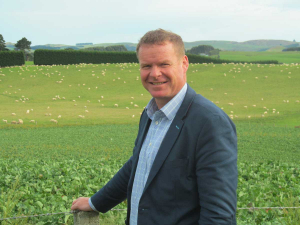Farmer confidence dips slightly, but positivity still dominates
Farmer confidence has taken a slight dip according to the final Rabobank rural confidence survey for the year.
 Rabobank New Zealand chief executive Todd Charteris says farmers with a pessimistic outlook cited government policy as a key reason.
Rabobank New Zealand chief executive Todd Charteris says farmers with a pessimistic outlook cited government policy as a key reason.
Government policies and the ongoing fallout from Covid-19 are being blamed for a continuing drop in farmer confidence.
According to the latest Rabobank Farmer Confidence Survey, New Zealand farmer confidence remains deep in negative territory, with significantly more farmers pessimistic than optimistic about the year ahead.
“After staging a strong recovery last quarter from historic lows recorded early in the year, New Zealand farmer confidence has reversed course again, sliding deeper into negative territory,” says Rabobank New Zealand chief executive Todd Charteris.
The quarterly survey – taken during September – found farmer confidence across NZ fell to -32% down from -26% previously. It also discovered that more farmers are now expecting the rural economy to deteriorate during the next 12 months.
It points out that the chief contributor to the lower confidence reading was markedly lower sheep and beef farmer sentiment, negating higher confidence levels reported among both dairy farmers and horticulturalists. Rabobank says this negative sentiment is driven by lingering concerns over government policy and the on-going impacts of Covid-19.
“More than half of all sheep and beef farmers with a pessimistic outlook cited government policy as a key reason for concern, with many likely to be worried about the potential for freshwater regulations announced in late May to negatively impact their operations,” Charteris added.
While sheep and beef farmers were more pessimistic, the survey found dairy farmers and horticulturalists more upbeat about the fortunes of the agricultural economy. Improving demand was the key reason for optimism among both dairy farmers and growers – cited by 45% of dairy farmers and 92% of horticulturalists who had a positive outlook on the year ahead.
However, while confidence in the broader economy lifted among dairy farmers and growers, Charteris said there were still more farmers in both those sectors adopting a pessimistic stance over an optimistic one.
“As with their sheep and beef counterparts, pessimistic dairy farmers cited government policy and Covid-19 as the most two most pressing concerns for the ag economy, while horticulturalists identified overseas markets as their major source of apprehension.”
Changed logos on shirts otherwise it will be business as usual when Fonterra’s consumer and related businesses are expected to change hands next month.
Reflecting on the past year, Horticulture New Zealand chief executive Kate Scott says there has been a lot to celebrate.
Ministry for Primary Industries (MPI) Director General Ray Smith is giving a big shout-out to the horticulture sector, especially kiwifruit.
Early forecasts for New Zealand's apples and pears point to a standout season marked by exceptional fruit quality and high pack-out rates.
Tickets are now available for Beef + Lamb New Zealand’s (B+LNZ) Out the Gate, returning from 19-21 May 2026 at Te Pae, Christchurch.
Dairy Women's Network (DWN) is welcoming AgriHealth as a new partner.

OPINION: Here w go: the election date is set for November 7 and the politicians are out of the gate…
OPINION: ECan data was released a few days ago showing Canterbury farmers have made “giant strides on environmental performance”.